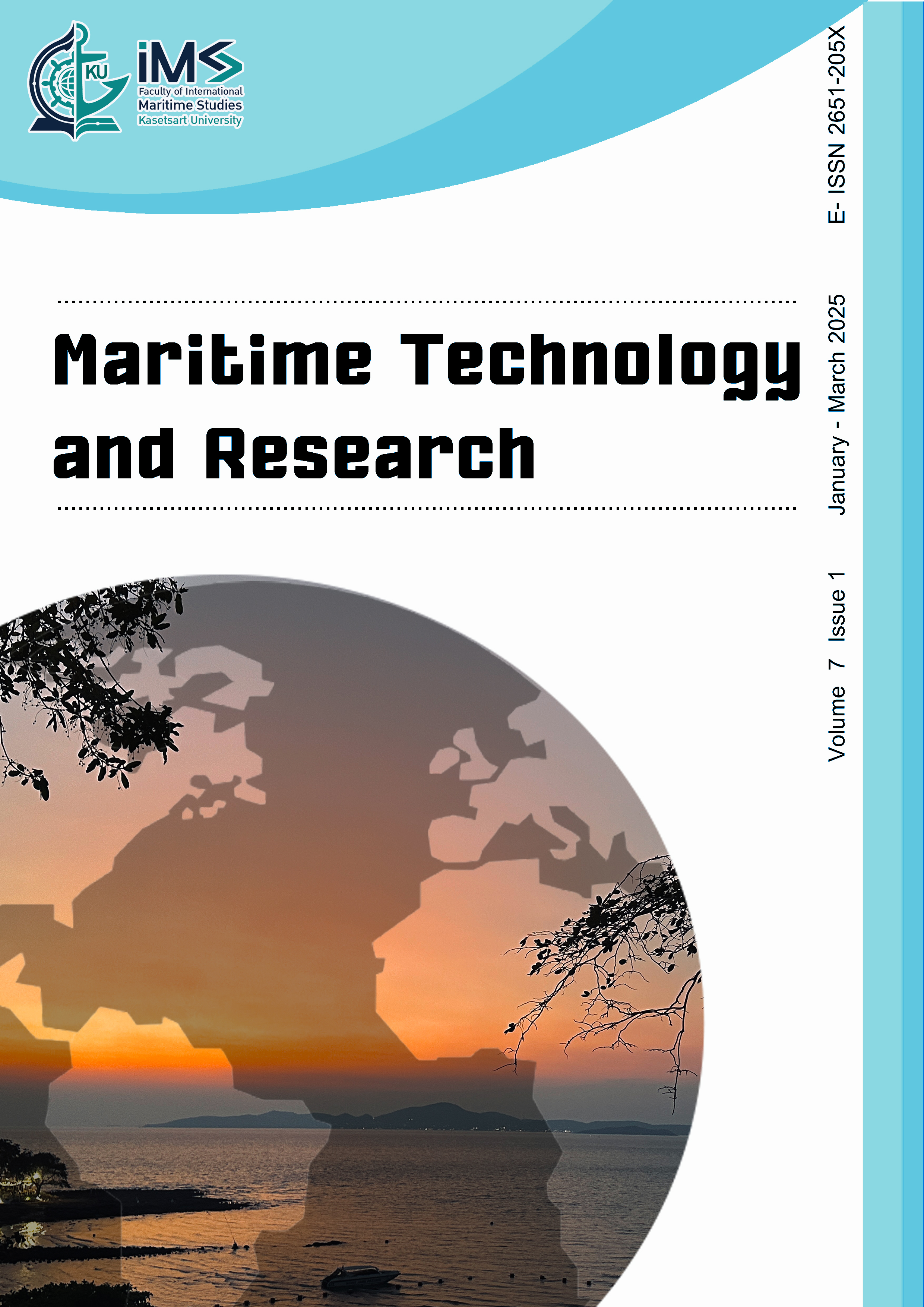Service excellence at sea: User satisfaction with Belawan Samudera Fishing Port, Indonesia
DOI:
https://doi.org/10.33175/mtr.2025.270067Keywords:
Belawan; CSI; Satisfaction; Fishing port; ServiceAbstract
The aim of this study was to assess the influence of service quality on user satisfaction at Belawan Samudera Fishing Port, Indonesia, a critical hub of fish logistics and supply chain in the Malacca Strait. The study used a mixed-method approach by combining surveys, observations, and in-depth interviews with key informants, and was conducted in August and September 2023. The evaluation of the fishing port service quality was based on five dimensions: tangibility, reliability, responsiveness, assurance, and empathy. The study involved a total of 66 respondents with an overall satisfaction rating of 75.5 %, indicating that users generally provided positive feedback. However, three port facilities did not meet the standards of the Minister of Maritime and Fisheries Affairs Decree Number 8 of 2012. The study showed deficits in the empathy and assurance aspects, and focus on enhancements to increase customer satisfaction is proposed. This study highlighted that optimizing operational efficiency and user satisfaction required improvements in regulatory compliance and quality management at the fishing port.
------------------------------------------------------------------------------
Cite this article:
APA Style:
Syahrianda, D.A., Suadi, & Djumanto. (2025). Service excellence at sea: User satisfaction with Belawan Samudera Fishing Port, Indonesia. Maritime Technology and Research, 7(1), 270067. https://doi.org/10.33175/mtr.2025.270067
MDPI Style:
Syahrianda, D.A.; Suadi; Djumanto. Service excellence at sea: User satisfaction with Belawan Samudera Fishing Port, Indonesia. Marit. Technol. Res. 2025, 7(1), 270067. https://doi.org/10.33175/mtr.2025.270067
Vancouver Style:
Syahrianda DA, Suadi, Djumanto. (2025). Service excellence at sea: User satisfaction with Belawan Samudera Fishing Port, Indonesia. Marit. Technol. Res. 7(1): 270067. https://doi.org/10.33175/mtr.2025.270067
------------------------------------------------------------------------------
Highlights
- Fishing port is a critical hub for fish logistics and supply chain
- Ensuring customer satisfaction in the management of fishing ports is essential for achieving service excellence and efficient port operations
- The evaluation of fishing port service quality is based on five elements of service quality: reliability, responsiveness, assurance, empathy, and tangibility
- Improvements in quality management and compliance with regulations aim to maximize operational efficiency and fishing port satisfaction
References
Allen, D. R. (2004). Customer satisfaction research management: A comprehensive guide to integrating customer loyalty and satisfaction metrics in the management of complex organizations (pp. 1-264). American Society for Quality, ASQ Quality Press, Milwaukee.
Anderson, E. W., & Fornell, C. (2000). Foundations of the American Customer Satisfaction Index. Total Quality Management, 11(7), 869-882. https://doi.org/10.1080/09544120050135425.
Arsovska, J. (2012). Researching difficult populations: interviewing techniques and methodological issues in face-to-face interviews in the study of organized crime (pp. 397-415). Handbook of Survey Methodology for the Social Sciences. https://doi.org/10.1007/978-1-4614-3876-2_23
Bae, H. (2016). Relationship between a Port’s Reputation, customer satisfaction and customer loyalty. Journal of International Logistics and Trade, 14(3), 174-181. https://doi.org/10.24006/jilt.2016.14.3.174.
Barabino, B., Deiana, E., & Tilocca, P. (2012). Measuring service quality in urban bus transport: A modified servqual approach. International Journal of Quality and Service Sciences, 4(3), 238-252. https://doi.org/10.1108/17566691211269567
BPS. (2022). Analisis Profil Penduduk Indonesia Mendeskripsikan Peran Penduduk dalam Pembangunan (Analysis of Indonesia]s population profile describes the role of population in development) (pp. 1-112). Badan Pusat Statistik.
Cho, C. H., Kim, B. I., & Hyun, J. H. (2010). A comparative analysis of the ports of Incheon and Shanghai: The cognitive service quality of ports, customer satisfaction, and post-behaviour. Total Quality Management, 21(9), 919-930. https://doi.org/10.1080/14783363.2010.487677
DeVellis, R. F., Thorpe, C. T. (2021). Scale development: Theory and applications (pp. 1-320). California: SAGE Publications.
Dinwoodie, J., Tuck, S., Knowles, H., Benhin, J., & Sansm, M. (2011). Sustainable development of maritime operations in ports. Business Strategy and the Environment, 21(2), 111-126. https://doi.org/10.1002/bse.718
Gideon, L. (2012). The art of question phrasing (pp. 91-107). Handbook of Survey Methodology for the Social Sciences. https://doi.org/10.1007/978-1-4614-3876-2_7
Ha, M. S. (2003). A comparison of service quality at major container ports: implications for Korean ports. Journal of Transport Geography, 11(2), 131-137. https://doi.org/10.1016/S0966-6923(02)00069-8
KKP. (2012). Regulation of the minister of maritime and fisheries affairs of the Republic of Indonesia Number 8 of 2012 concerning Fishing Ports. Republic of Indonesia.
Lu, J., Gong, X., & Wang, L. (2011). An empirical study of container terminal’s service attributes. Journal of Service Science and Management, 4(1), 97-109. http://dx.doi.org/10.4236/jssm.2011.41013
Marczyk, G. R., DeMatteo, D., & Festinger, D. (2005). Essentials of research design and methodology. John Wiley & Sons.
Mittal, V., & Kamakura, W. A. (2001). Satisfaction, repurchase intent, and repurchase behavior: Investigating the moderating effect of customer characteristics. Journal of Marketing Research, 38(1), 131-142. https://doi.org/10.1509/jmkr.38.1.131.18832
Mollaoglu, M., Gurturk, M., Celik, E., & Gul, M. (2023). Interval type-2 trapezoidal fuzzy AHP: Evaluation of sustainable port service quality factors (pp. 27-45). In Analytic Hierarchy Process with Fuzzy Sets Extensions: Applications and Discussions. Cham: Springer International Publishing. https://doi.org/10.1007/978-3-031-39438-6_2
Neysi, A., & Dadkhah, A. (2013). Developing affective model for measuring and managing customer satisfaction in container ports. Journal of Asian Business Strategy, 3(9), 224-232.
Nur, F., Suadi, & Suwarman. (2023). Enhancing fishing port services quality to support fish supply chains of the island fisheries at the Belitung island. Jurnal Perikanan Universitas Gadjah Mada, 25(1), 31. https://doi.org/10.22146/jfs.82811
Nurhayatin, O. T., Mudzakir, A. K., & Wibowo, B. A. (2016). Analysis of fishermen’s satisfaction level towards services of fishing needs provided in Nusantara Fishing Port (PPN) Prigi, Trenggalek Regency, East Java. Journal of Fisheries Resources Utilization Management and Technology, 5(1), 12-27.
Parasuraman, A., Zeithaml, V. A., & Berry, L. L. (1988) Servqual: A multiple-item scale for measuring consumer perceptions of service quality. Journal of Retailing, 64, 12-40.
Putera, I., Suadi, & Budhiyanti, S. (2022). User’s satisfaction levels toward Sadeng coastal fishing port service at Gunungkidul Regency. Marine Fisheries Journal of Marine Fisheries Technology and Management, 13(2), 149-160. https://doi.org/10.29244/jmf.v13i2.41020.
Rangkuti, F. (2006). Measuring customer satisfaction: Measuring techniques and strategies to increase customer satisfaction and analysis of PLN Case-JP. Gramedia Pustaka Utama.
Rust, R. T., & Zahorik, A. J. (1993). Customer satisfaction, customer retention, and market share. Journal of Retailing, 69(2), 193-215. https://doi.org/10.1016/0022-4359(93)90003-2.
Sam, E. F., Hamidu, O., & Daniëls, S. (2018). Servqual analysis of public bus transport services in Kumasi metropolis, Ghana: Core user perspectives. Case Studies on Transport Policy, 6(1), 25-31. https://doi.org/10.1016/j.cstp.2017.12.004
Speir, C., Caroline, P., & Jon, G. S. (2014). Port level fishing dynamics: Assessing changes in the distribution of fishing activity over time. Marine Policy, 46, 171-191. https://doi.org/10.1016/j.marpol.2014.01.014
Thai, V. V. (2016). The impact of port service quality on customer satisfaction: The case of Singapore. Maritime Economics & Logistics, 18, 458-475. https://doi.org/10.1057/mel.2015.19
Ugboma, C., Callistus, I., & Innocent, C. O. (2004). Service quality measurements in ports of a developing economy: Nigerian ports survey. Managing Service Quality, 14(6), 487-495. https://doi.org/10.1108/09604520410569829
Downloads
Published
Issue
Section
Categories
License
Copyright (c) 2024 Maritime Technology and Research

This work is licensed under a Creative Commons Attribution-NonCommercial-NoDerivatives 4.0 International License.
Copyright: CC BY-NC-ND 4.0








